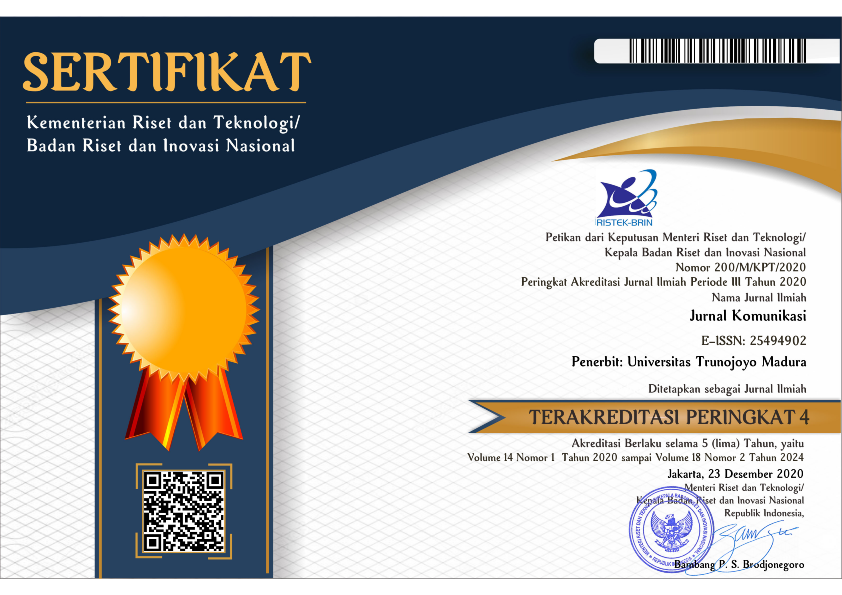PERSEPSI TERHADAP PICTORIAL HEALTH WARNING IKLAN LUAR RUANG PRODUK ROKOK
Abstract
ABSTRACT
This research emphasizes on Pictorial Health Warning (PHW) in outdoor media
of cigarettes product’s advertisement, focusing on smoker’s perception towards
pictorial health warning of “A man smoking with the skull shaped smokes”
variant.
This study uses qualitative descriptive method exploring the perception on the
particular pictorial health warning variant. Informants in this research are
located in several big cities in Indonesia. The purpose of this research is to
enrich the body of knowledge on health communication, especially on the danger
of smoking, and also enforcing government in the effort of communicating the
hazardous of smoking towards its public.
Key words: pictorial health warning, cigarette, outdoor advertisement
Full Text:
PDF (Bahasa Indonesia)References
DAFTAR PUSTAKA
Arnez, M. (2009). Tobacco and Kretek: Indonesian Drugs in Historical Change. Austrian
Journal of South East Asian Studies vol 2 (1) , 49-69.
Belch, G. E., & Belch, M. A. (2003). Advertising and Promotion, Sixth Edition. The
McGraw-Hill Companies.
Deutsches Krebsforschungszentrum . (2013). Effectiveness of Pictorial Health Warnings
on Cigarette Packages. Retrieved July 8, 2014, from German Cancer Research
Center: http://www.dkfz.de/de/tabakkontrolle/download/Publikationen/AdWfP/
AdWfP_Pictorial_Health_Warnings.pdf
Elliot, R., & Timulak, L. (2005). Descriptive and interpretive approaches to qualitative
research. In J. Miles, & P. Gilber (Eds.), A Handbook of Research Methods for
Clinical and Health Psychology (pp. 147-159). Oxford: Oxford University Press.
Hanusz, M. (2000). Kretek: The Culture and Heritage of Indonesia’s clove cigarettes.
Jakarta: Equinox Publishing (Asia) Pte. Ltd.
Katz, H. E. (2003). The Media Handbook, Second Edition. Mahwah: Lawrence Erlbaum
Associates, Inc.
Lambert, V. A., & Lambert, C. E. (2012). Editorial: Qualitative Descriptive Research: An
Acceptable Design. Pacific Rim International; Journal of Nursing Research , XVI
(4), 255-256.
Priyatna, C. C., & Sani, A. (2014). Mitos Kejantanan Pada Pictorial Health Warning
Iklan Luar Ruang Produk Rokok. (U. R. Handaningtias, Ed.) Jurnal Riset Ilmu
Komunikasi , V (10), 1-15.
Reid, A. (1985). From Betel-Chewing to Tobacco-Smoking in Indonesia. The Journal of
Asian Studies Vol 44 No.3 , 529.
Ricklefs, M. (1993). A History of Modern Indonesia since c.1300 Second Edition. London
: The MacMillan Press Ltd.
Sandlowski, M. (2000). Focus on Research Method; Whatever Happened to Qualitative
Description. Research in Nursing & Health , 334-340.
Sekjen Kementrian Kesehatan RI. (2014, June 24). Indonesia Harus Melek Bahaya
Merokok. Retrieved July 10, 2014, from Depkes.go.id: http://depkes.go.id/index.
php?vw=2&id=NW.201407010002
WHO. (2014). World Health Organization. Retrieved July 10, 2014, from WHO Health
Warning Database: http://www.who.int/tobacco/healthwarningsdatabase/en/
World Health Organization. (2005). WHO Framework Convention on Tobacco Control.
Geneva: WHO Press.
DOI: https://doi.org/10.21107/ilkom.v10i1.1832
Refbacks
- There are currently no refbacks.
Copyright (c) 2016 Centurion Chandratama Priyatna, Anwar Sani

This work is licensed under a Creative Commons Attribution-ShareAlike 4.0 International License.
Jurnal Komunikasi by Universitas Trunojoyo Madura is licensed under a Creative Commons Attribution-ShareAlike 4.0 International License.















